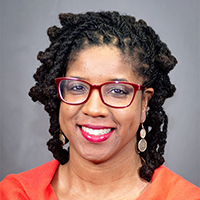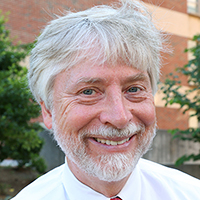

On April 5th Dr. Samuel Cykert and Ms. Christina Younge will be presenting the PCC live webinar on “Where the Rubber Meets the Road: Community-Inclusive Interventions to Achieve Equity in Cancer Care” from 12:00 PM-1:00 PM. Dr. Cykert is a Professor of Medicine at the University of North Carolina – Chapel Hill in the Division of General Internal Medicine and Clinical Epidemiology and Ms.Yongue is the Director of Undergraduate Studies and an Associate Professor in the Department of Public Health Education at the University of North Carolina at Greensboro. In preparation for their upcoming lecture, we asked them both a few questions about Health Equity and Disparities in Cancer.
Can you tell us a little about your background and how you became interested in Health Equity in Cancer Care?
Dr.Cykert: Back in 1999, I was interested in how patients were evaluated for operations on their lungs, especially lung cancer surgery. I came across a New England Journal article by Peter Bach showing that Black patients with curable lung cancer were getting curative surgeries 20% less often than White patients. This made no sense for a disease that is nearly 100% fatal in 4 years if left untreated. I then started diving into cancer treatment literature and saw how widespread cancer treatment disparities were and how these inequities led to excess mortality for Black individuals.
Ms.Yongue: I became interested in Health Equity in Cancer Care mainly due to two reasons. First, as a daughter of a Black mother who died of a treatable cancer, I felt the devastating impact of racial health inequities firsthand. The loss of such a valuable woman in my family, before her life expectancy, before she got to be a grandmother, was an experience with grief that motivated me to get more deeply involved in being a part of the solutions to solve these persistent racial inequities so that other families would not have to suffer like mine did. Second, I was prepared to address public health problems as a priority due to my chosen educational route of leaving pharmacy school to study disease prevention, community health promotion, and social and behavioral sciences.
Who is considered underserved when it pertains to Cancer Care? (Dr.Cykert)
Almost all people of color suffer some disparities but Black patients and Native Americans are strikingly the most affected
Which race has the highest Cancer Mortality rate? Why is this? (Ms.Yongue)
African Americans / Black Americans are dealing with the highest cancer mortality rate in the United States for the past decade and longer, according to the Centers for Disease Control. (See attachment). Medical institutions face differences in racial outcomes of their cancer patients due to some not having structures that sustain antiracism work.
What does the term health equity mean and how does it relate to cancer care? (Dr.Cykert)
Health equity means excellent health for everyone. To achieve this we must provide the best possible healthcare. We can’t control all the social determinants of health but the medical system can and must achieve excellent care for everyone in terms of both prevention and treatment.
What are a few things the community could be doing to help reduce cancer treatment disparities? (Ms.Yongue)
To reduce cancer treatment disparities, some things the community could do is to use the antiracism principle of “institutional transparency” and request to know what the cancer racial disparities are for the hospitals that service them and to offer to serve on community board of directors for hospitals to help with decision-making within medical centers.
What are you hoping the audience will take away from this lecture?
Dr.Cykert: That by partnering with communities and having great people use great technology we can achieve the real time transparency and accountability needed to provide optimal care for all.
Ms.Yongue: I hope the audience will take away from this lecture more knowledge about the underlying causes of why racial disparities continue to exist and some innovative and evidence-based intervention models they can try to reduce racial disparities in their own institutions in partnership with community leaders in their respective cities.
Thank you both Dr.Cykert and Ms.Yongue!
Please be sure to tune in to our Patient-Centered Care Lecture “Where the Rubber Meets the Road: Community-Inclusive Interventions to Achieve Equity in Cancer Care” with Dr. Cykert and Ms.Yongue on April 5th from 12:00 PM-1:00 PM. Register here